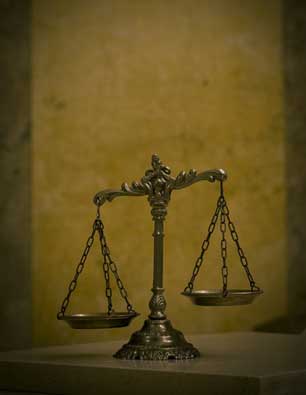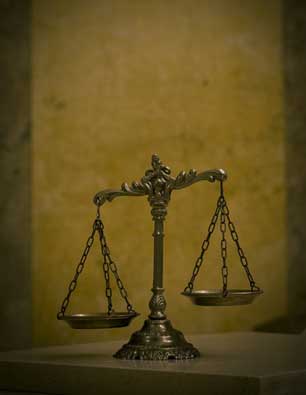 (Image: Justice scales via Shutterstock)A coalition of seven female Nobel Prize winners, including Dr. Rigoberta Menchú Tum of Guatemala, called April 25 for the trial of former dictator Efraín Rios Montt to proceed. Montt, along with former military intelligence head Mauricio Rodriguez Sanchez, was indicted in January for genocide and crimes against humanity, including widespread rape. The trial in Guatemala City was suspended last week mere days before observers expected it to conclude when a lower court judge on April 18 unexpectedly issued a ruling on a legal technicality. Guatemala’s attorney general has called the ruling illegal.
(Image: Justice scales via Shutterstock)A coalition of seven female Nobel Prize winners, including Dr. Rigoberta Menchú Tum of Guatemala, called April 25 for the trial of former dictator Efraín Rios Montt to proceed. Montt, along with former military intelligence head Mauricio Rodriguez Sanchez, was indicted in January for genocide and crimes against humanity, including widespread rape. The trial in Guatemala City was suspended last week mere days before observers expected it to conclude when a lower court judge on April 18 unexpectedly issued a ruling on a legal technicality. Guatemala’s attorney general has called the ruling illegal.
The trial marks the first time a head of state has been tried for genocide by his own country’s justice system. Rios Montt is accused of ordering the killings of over 1,700 Ixil Maya people in 1982 and 1983, when he was army general and de-facto president of Guatemala.
Menchú Tum and a panel of human right experts convened a call with reporters last Thursday hours before the country’s constitutional court issued a ruling on an evidence question in favor of the defense, but looming even larger is a pending decision on an annulment ordered by the lower court judge. Until that comes down, it is unclear whether the trial will pick up where it left off, return to the pretrial phase, or revert to a midpoint in the proceedings. The uncertainty has heightened concern for survivors and human rights defenders in the country. Panelists said the over 100 survivors who gave testimony at the trial now face a kind of double jeopardy.
“If the defense managed to annul the trial, we would have to wait for, we believe, a long time, maybe years, and this is a period that will be of high risk,” said Claudia Samayoa of the Human Rights Defenders Protection Unit in Guatemala (UNDEFEGUA by its Spanish initials).
After similar disruptions in previous high-profile trials, Guatemala’s powerbrokers did not easily relinquish the impunity they have so long enjoyed. “They know which witnesses have the most damaging testimony, and they look for extrajudicial ways of silencing them,” said Samayoa.
The trials’ suspension comes after witnesses, some of whom covered their faces with cloth during their testimonies, also faced major personal barriers to speaking out.
“The most powerful testimonies came from women, and basically, women that addressed the issue of not only sexual violence, but also sexual slavery that happened during the period in which they were concentrated all inside the military base,” said Samayoa. “Some of them have had to come back to their husbands that didn’t know the extent of the violence against them.”
The civil war in Guatemala began following the CIA-backed 1954 overthrow of populist president Jacobo Árbenz Guzmán, a supporter of indigenous-led land reform efforts that threatened the holdings of northern agribusiness. More than 200,000 people were killed, and 1 million fled the country.
Two panelists, analyst Kate Doyle of the nonprofit research institute the National Security Archive and filmmaker Pamela Yates, contributed evidence for the prosecution. “The recent walkout by the defense lawyers followed by a lower judge’s ruling to vacate the trial and a wave of new defense appeals is, in my opinion, a transparent effort to sabotage the case,” said Doyle. The archive obtained documents from the CIA, the US Embassy in Guatemala, the Guatemalan government and other sources.
Doyle described military orders and field reports related to scorched earth campaigns in the Ixil region. “Officers at the patrol level describe in detail attacks they were carrying out,” said Doyle. “They noted when they killed unarmed civilians, burned houses, slaughtered animals and captured children.” The military operations covered in the trial took place over a 13-month period during Guatemala’s 36-year civil war. The systematic killing of indigenous Maya civilians, including elderly, children and pregnant women during the war, which often involved torture, rape and other brutality, has been documented at length by civil society groups for decades.
Another key piece of evidence in the trial is footage of outtakes from Yates’ 1983 documentary film on the war, which was banned in the country for 20 years. Yates said Montt, who maintains he did not order the killings, clearly claims he was the top of the army chain of command in an interview tape she resurrected from a New Jersey warehouse after being approached by an attorney following a 2003 screening in Guatemala.
But panelists said the latest turns in the trial, which began March 19, seem to hinge on manipulation rather than evidence. “They never intended to actually mount a defense,” said Yates. “It was clear that at some point, they would just abandon the defense.”
Contributing to tensions outside the courtroom is an organization calling itself The Foundation Against Terrorism and operating as a government-permitted nonprofit. UNDEFEGUA says the group helped fund a march on April 23 by 500 people claiming to be Ixil and denying that a genocide against their people occurred. UNDEFEGUA members said the marchers were told they would receive fertilizer and social assistance from the government in exchange for participating in the demonstration. The Foundation Against Terrorism’s president is Ricardo Mendez Ruiz, the son of Guatemala’s minister of the interior. Montt’s attorney Moises Galindo is a member, and according to UNDEFEGUA, the group’s vice president; Ruiz told an online publication last year that Galindo was secretary.
The Foundation also funded 20-page inserts in two recent Sunday editions of El Periódico, one of the country’s major newspapers, claiming genocide never took place in Guatemala and calling accusations of genocide “a Marxist conspiracy of the Catholic church.” The inserts outraged advocates like Samayoa.
“They are what we call a death list, because they are basically saying who are the human rights defenders that are communists.” During the war, death squads targeting guerrillas and the indigenous civilians routinely accused of supporting them received US support under the guise of cold war-era anti-communist efforts. “They have drawn a continuum, a line between the guerillas in the 80s and what is actually happening” now, said Samayoa.
UNDEFEGUA has documented 258 attacks on human rights advocates in the two months since the trial began, in contrast to February, when only 14 such incidents were counted.
Now the country and the international community hold their breath to see how the maze of challenges, most levied by the defense and hinging on procedural issues, play out. The constitutional court has already ruled in favor of the defense on its challenge to the expulsion of one of Montt’s attorneys on the first day of the trial, and it rejected a filing by the prosecution challenging the annulment. Now, the constitutional court maintains that a lower court should rule on the annulment. It is unclear when that ruling may take place. The complex process has wrought notable confusion; last week a US media outlet reported that the annulment was already final and later printed a correction.
“In the past, various of the magistrates have shown themselves to be somewhat partial to the accused in similar cases, but in this case – and this is very much my own personal interpretation – it seems like they’re just trying to avoid making the final decision,” said Kathryn Johnson with the Guatemalan Human Rights Commission.
While the trial’s suspension has been wrenching for many, panelists on Thursday’s press call said the trial signals progress not only for being the first of its kind, but also for reopening a painful chapter of history that many prefer to keep hidden but which others maintain must be faced if the country is to move forward. “A lot of doubters now know, and [young people] are questioning the adults, ‘Why are you keeping this from us?’ ” said Samayoa.
It has also been an opportunity to challenge cultural norms. “We are a machista society, and men have tried to condemn the women because they have given testimony” about being sexually assaulted, said Samayoa. But she said men and women supporters “have managed to explain to these macho men that women have not committed a crime, they’re not guilty of anything, and that, actually, they should be very proud of them.”
Bringing Rios Montt to trial in the first place is regarded as a major victory. “It’s such a show of the strength and maturity of the Guatemalan judicial system,” said Johnson.
“There were not burning cars in the street,” said Doyle. “There were peaceful demonstrations and a peaceful and packed courtroom every single day.”
But threats and verbal harassment of survivors and their supporters continues. UNDEFEGUA’s Guatemala City offices were broken into last week, and its staff have received written threats. Attorney General Claudia Paz y Paz has been threatened in person. Smears of Menchú Tum, whose 1992 Nobel honored her work on indigenous rights, have appeared in opinion editorials, protest banners and online. She bristles recalling one that dubbed her the Nobel War Laureate; others strike a similar adolescent tone, which either masks or intensifies the menace underneath.
“The perpetrators of genocide are determined to stop justice at any cost,” said Menchú Tum, who called on the international community to follow the lead of her coalition, known as the Nobel Women’s Initiative, and demonstrate its solidarity with survivors, supporters and Attorney General Paz y Paz.
“We have to rally around these women,” she said.
Our most important fundraising appeal of the year
December is the most critical time of year for Truthout, because our nonprofit news is funded almost entirely by individual donations from readers like you. So before you navigate away, we ask that you take just a second to support Truthout with a tax-deductible donation.
This year is a little different. We are up against a far-reaching, wide-scale attack on press freedom coming from the Trump administration. 2025 was a year of frightening censorship, news industry corporate consolidation, and worsening financial conditions for progressive nonprofits across the board.
We can only resist Trump’s agenda by cultivating a strong base of support. The right-wing mediasphere is funded comfortably by billionaire owners and venture capitalist philanthropists. At Truthout, we have you.
We’ve set an ambitious target for our year-end campaign — a goal of $250,000 to keep up our fight against authoritarianism in 2026. Please take a meaningful action in this fight: make a one-time or monthly donation to Truthout before December 31. If you have the means, please dig deep.
